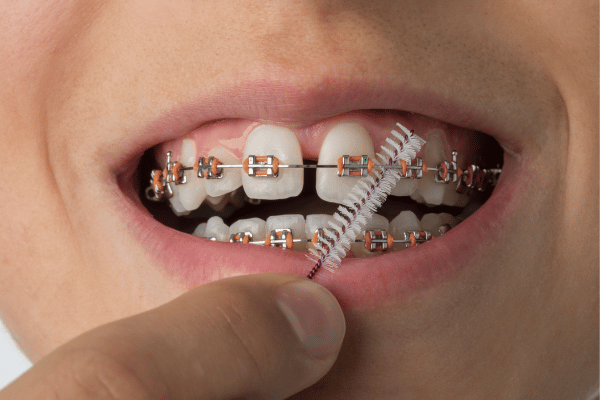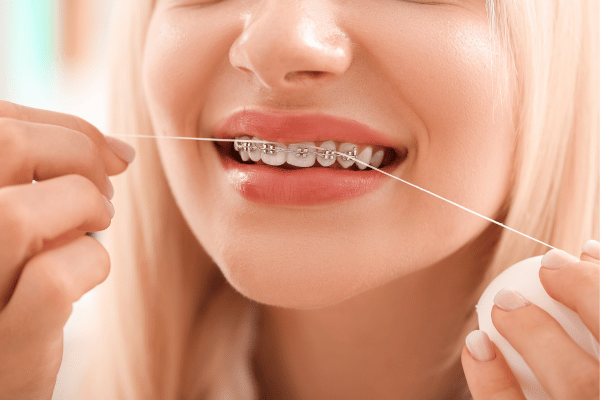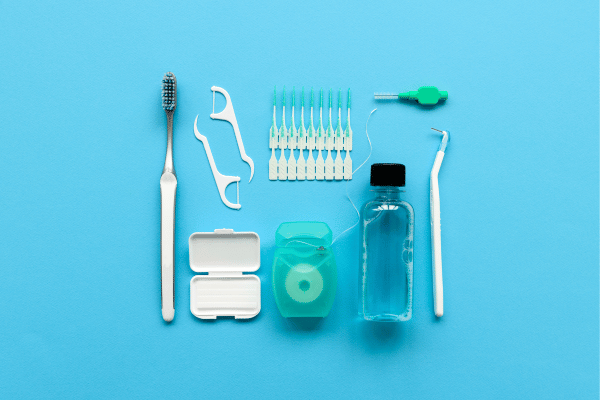Maintaining oral hygiene is crucial for everyone, but it becomes especially important when you have braces. Braces, while highly effective in straightening teeth and fixing bite issues, can also present unique challenges for maintaining oral health. The brackets and wires create nooks and crannies that can trap food particles and plaque, leading to a higher risk of dental issues like cavities and gum disease if not properly managed.
Our goal is to provide you with actionable tips and techniques that will help you navigate the challenges of oral hygiene with braces, ensuring a smooth and successful journey to a brighter, healthier smile. Whether you’re a teenager embarking on this journey or an adult seeking to improve your dental health and aesthetics, this guide is designed to empower you with the knowledge you need to maintain optimal oral hygiene with braces.
The Importance of Oral Hygiene with Braces
Oral hygiene is vital for everyone, but when you have braces, it’s even more crucial. Braces can trap food and plaque around your teeth and gums, which can lead to several problems if not cleaned properly. Understanding the risks and benefits associated with good oral hygiene practices can motivate us to adhere to a diligent care routine.
Risks of Poor Oral Hygiene with Braces
Neglecting oral hygiene when you have braces can lead to several dental issues, including:
- Plaque Build-up: Braces can make it easier for plaque, a sticky film of bacteria, to accumulate around the brackets and under the wires, leading to tooth decay and gum disease.
- Cavities: The trapped food particles and plaque can result in cavities, which are permanent damages to the tooth surface.
- Gum Disease: Inflammation of the gums, or gingivitis, can progress to more severe gum disease, causing swelling, bleeding, and even tooth loss in extreme cases.
- Staining: Plaque accumulation can also cause staining around the brackets, leading to uneven tooth color once the braces are removed.
Understanding these risks highlights the importance of maintaining strict oral hygiene routines to protect your teeth and gums during orthodontic treatment.
Benefits of Good Oral Hygiene Practices
Maintaining good oral hygiene with braces isn’t just about avoiding negative outcomes; it also comes with significant benefits:
- Healthier Teeth and Gums: Regular cleaning reduces plaque and bacteria, keeping your teeth and gums healthy.
- Better Orthodontic Results: Clean teeth move more easily and quickly into their correct positions, potentially reducing the time you need to wear braces.
- Prevention of Bad Breath: Good oral hygiene helps prevent bad breath caused by decaying food particles and bacteria.
- Increased Confidence: Knowing your mouth is clean and healthy can boost your confidence, making the orthodontic journey more pleasant.
Essential Oral Hygiene Practices

Maintaining oral hygiene with braces requires a bit more effort and dedication, but it’s well worth it for the health of your teeth and gums. Here are the cornerstone practices that should form the foundation of your oral care routine.
“During braces, it is important to avoid sticky and hard-textured foods. It is crucial to pay extra attention to the space around your braces and remove all traces of food.” -Dr. Athar
Brushing Technique and Frequency
With braces, brushing your teeth properly becomes even more crucial. Here’s how to do it right:
- Frequency: Brush at least twice a day, but ideally after every meal and snack. This helps remove food particles and plaque that get trapped around your braces.
- Type of Brush: Use a soft-bristled toothbrush or an electric toothbrush designed for braces. These brushes are better at cleaning around brackets and wires.
- Technique: Brush at a 45-degree angle to the gums, ensuring you clean both the upper and lower parts of the braces. Spend about 30 seconds on each section of your mouth, covering all surfaces of your teeth.
- Toothpaste: Use fluoride toothpaste to help prevent cavities and strengthen tooth enamel.
Remember, with braces, you need to be gentle to avoid damaging the brackets and wires while ensuring a thorough clean.
Flossing with Braces

Flossing with braces can be challenging, but it’s essential for removing plaque and food particles that your toothbrush can’t reach.
- Tools: Use a floss threader or orthodontic flossers designed for braces to help get the floss under the wires.
- Frequency: Floss at least once a day, ideally before bedtime, to ensure your teeth are clean before you sleep.
- Technique: Carefully thread the floss between each tooth and the wire, gently moving it up and down along the sides of both teeth and under the gumline.
Flossing might take a bit longer with braces, but it’s a crucial step in preventing gum disease and cavities.
Rinsing
Mouthwash can be a helpful addition to your oral hygiene routine, especially with braces.
- Type of Rinse: Use a fluoride mouthwash to help reduce plaque, prevent cavities, and keep your gums healthy. For those with sensitive mouths, an alcohol-free mouthwash may be more comfortable.
- Frequency: Rinse once a day, following brushing and flossing, to help remove any lingering particles and keep your mouth feeling fresh.
Rinsing with mouthwash is a quick step that can make a big difference in your oral health.
Special Considerations for Braces Wearers
Dietary Adjustments
What you eat plays a significant role in maintaining oral hygiene with braces.
- Foods to Avoid: Hard, sticky, and chewy foods can damage braces and trap food particles. Avoid items like popcorn, nuts, hard candies, and gum.
- Braces-friendly Foods: Opt for softer foods that are easier to clean off your braces. Soups, smoothies, pasta, and steamed vegetables are all good choices.
- Sugary and Acidic Foods: Minimize consumption of sugary and acidic foods and beverages, as they can lead to tooth decay and enamel erosion.
Making smart dietary choices can prevent damage to your braces and reduce the risk of dental problems.
Dealing with Discomfort
Braces can sometimes cause discomfort, especially after adjustments. Here are a few tips to manage it:
- Pain Relief: Over-the-counter pain relievers can help manage pain. Always follow the recommended dosages.
- Oral Care Products: Products like orthodontic wax can be applied to brackets that are irritating your cheeks or lips.
- Soft Foods: Eating soft foods can reduce discomfort during sensitive periods.
Regular Dental Check-ups
Regular visits to your orthodontist and dentist are crucial for monitoring the progress of your treatment and addressing any oral health issues promptly.
- Orthodontic Appointments: These are necessary to adjust your braces and ensure your treatment is progressing as planned.
- Dental Cleanings: Professional cleanings remove plaque and tartar buildup that’s hard to get rid of with home care alone.
“Consulting with an experienced orthodontist is key to unlock the full potential of a transformative smile makeover that goes beyond the surface, to foster lasting oral health and confidence. A smile makeover can address various orthodontic concerns, promoting a harmonious balance between functionality, aesthetics, and long-term well-being.” – Dr. Athar
Product Recommendations

Equipping yourself with the right tools can make maintaining oral hygiene with braces much easier and more effective. Here are some product recommendations that can help you keep your braces and teeth clean:
Cleaning Tools
- Orthodontic Toothbrushes: These toothbrushes have specially designed bristles that make it easier to clean around braces and wires. Look for brushes labeled “for orthodontics.”
- Electric Toothbrushes: An electric toothbrush with an orthodontic head can provide a more thorough cleaning by reaching hard-to-clean areas around braces.
- Water Flossers: Also known as oral irrigators, water flossers can be particularly effective for braces wearers. They use a stream of pulsating water to remove food particles and plaque between teeth and around the brackets.
- Interdental Brushes: These small brushes are perfect for cleaning between braces and under wires, providing an additional way to remove plaque and food debris.
Rinses and Toothpaste
- Fluoride Toothpaste: A toothpaste containing fluoride is essential for strengthening tooth enamel and preventing cavities. There are specific toothpaste formulations designed for people with braces.
- Antiseptic Mouthwash: An antiseptic mouthwash can help reduce bacteria in your mouth, preventing gum disease and tooth decay. Choose a fluoride-enriched product for additional benefits.
- Orthodontic Wax: While not a cleaning product, orthodontic wax can be a lifesaver for braces wearers. It can be applied over brackets to prevent irritation of your lips or cheeks.
Investing in these products can significantly enhance your oral hygiene routine, ensuring your braces work effectively without compromising the health of your teeth and gums.
Final Thoughts
Maintaining oral hygiene with braces might seem daunting at first, but with the right practices and tools, it’s entirely manageable. Brushing, flossing, and rinsing regularly, along with making adjustments to your diet and attending regular dental check-ups, are key to ensuring your orthodontic treatment is successful and your mouth stays healthy.
Remember, the effort you put into maintaining your oral hygiene with braces will pay off with a beautiful, healthy smile once your orthodontic treatment is complete. If you ever have questions or concerns about your oral hygiene routine, don’t hesitate to reach out to your orthodontist or dentist. They are your best resources for ensuring your treatment goes smoothly and your oral health is preserved.
FAQs
1. Can I still eat my favorite foods with braces?
It’s advisable to avoid hard, sticky, and chewy foods that can damage your braces. However, you don’t have to give up all your favorites. Many foods can be modified to be braces-friendly, such as cutting apples into small, bite-sized pieces or choosing soft-baked treats instead of hard cookies.
2. How often should I replace my toothbrush?
With braces, your toothbrush might wear out faster than usual. Replace your toothbrush or electric toothbrush head every 3 to 4 months, or sooner if the bristles become frayed.
3. What should I do if a wire breaks?
If a wire breaks or sticks out, it can cause discomfort. Use orthodontic wax to cover the sharp end and contact your orthodontist as soon as possible for a repair.
4. Is it normal for my teeth to feel loose?
Yes, it’s normal for teeth to feel slightly loose during orthodontic treatment. This sensation means your teeth are moving into their new positions. However, if you experience significant movement or discomfort, consult your orthodontist.
